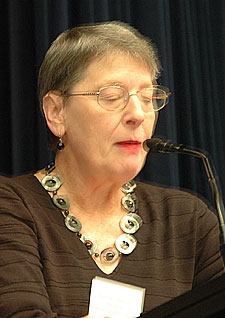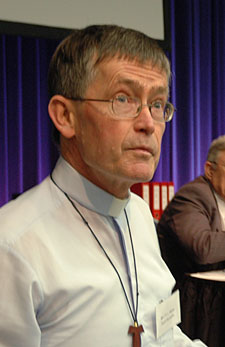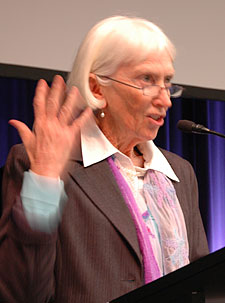Synod has strongly affirmed the ministry of women in the Diocese after the Rev Chris Albany’s motion calling the Archbishop to consider how different views on women's involvement in ministry can be "creatively lived out" in the Diocese was lost.
 The successful motion, moved by Deaconess Margaret Rodgers, thanked God "for the creative and God-honouring ministry of women in the Diocese of Sydney, including lay women in parishes, licensed lay workers, pastoral workers, clergy wives, chaplains and ordained deacons.
The successful motion, moved by Deaconess Margaret Rodgers, thanked God "for the creative and God-honouring ministry of women in the Diocese of Sydney, including lay women in parishes, licensed lay workers, pastoral workers, clergy wives, chaplains and ordained deacons.
The motion also included thanks to God for the number of women training and preparing for ministry, and a request for parish leaders to encourage "many other mature and gifted women members" to undertake theological and ministry training, so that their contribution to ministry in Sydney and beyond could be enhanced.
Deaconess Rodgers moved the motion after her "disquiet" at a lack of comments of support and acknowledgement for women's ministry in the Diocese after Mr Albany’s motion was debated at last year's Synod.
"How many parishes are kept alive and active in outreach through the commitment, prayer and sheer hard work of the women members?" she asked rhetorically.
"No other diocese in the Anglican Church of Australia has as many trained women in ministry as we have in this diocese, and we must recognise this with thanksgiving to God," Deaconess Rodgers said.
The debate
 The Rev Chris Albany's motion called on Synod to recognise the views of "a small but significant minority within the Diocese" who “hold that Scripture supports and endorses” women's involvement in all aspects of ministry, including eldership of the congregation (being ordained priests and bishops) and asked the Archbishop to consider how these perspectives could "be creatively lived out in the life and practice of the Diocese".
The Rev Chris Albany's motion called on Synod to recognise the views of "a small but significant minority within the Diocese" who “hold that Scripture supports and endorses” women's involvement in all aspects of ministry, including eldership of the congregation (being ordained priests and bishops) and asked the Archbishop to consider how these perspectives could "be creatively lived out in the life and practice of the Diocese".
The debate " carried over from Synod last year " was to centre on an amendment brought by Robert Tong, which had sought to forward an amended version of Mr Albany's motion to General Synod for discussion in the context of the Anglican Church of Australia.
However Mr Tong withdrew his amendment yesterday, as General Synod does not meet for another two years, and asked Synod to vote on Mr Albany's motion "as he has conceived and proposes it".
Mr Tong said he believed the motion to be "essentially flawed" as it called on Archbishop Jensen to "act contrary to his expressed conscience" and to "act contrary to Scripture".
As he commended the motion to the Synod, Mr Albany asked for dialogue and consideration of how women within and outside Sydney might be able to serve in eldership positions in parishes who supported and endorsed their ministry.
"The motion is not asking you to change, but it is asking you to take seriously and respectfully those with a differing point of view," Mr Albany said.
Elisabeth Boyce, one of those speaking in support of Mr Albany's motion, said "There are people on both sides of this argument who submit to the authority of Scripture, who believe all the fundamentals as outlined in the creeds, and who have different views on women's ministry."
"Indeed, I'm assuming that this is one of the "secondary matters' or "issues that divide us' which are referred to in the 12th paragraph of the Jerusalem Declaration of GAFCON."
However Dr John Woodhouse said accepting the motion would bring about a "dramatic U-turn with massive consequences", and the Diocese could not entertain more than one view.
Rather, it had to decide to align itself firmly with one of two views: complementarian (in which men and women are of equal worth but have different responsibilities in church and family life) or egalitarian (equality with no distinction in responsibility).
"The consequences would be that our diocese would very soon divide structurally," he said. "We would have clergy only able to minister in some of our parishes. Whether we like it or not, this is one of those matters where, as a diocese, we have to decide one practice or the other " and whichever we choose, the freedoms of some will be restricted."
Dr Woodhouse also referred briefly to the time and effort Synod had dedicated to the debate over the years.
"Consistently, reports and decisions of the Synod have concluded that the teaching of the Bible is against this proposal," he said.
 Archdeacon Narelle Jarrett spoke of her own journey between the two views, that led her to accept that eldership of a congregation is for men only.
Archdeacon Narelle Jarrett spoke of her own journey between the two views, that led her to accept that eldership of a congregation is for men only.
Her conclusion had come after careful study and consideration of Scripture "from Genesis to Revelation", and in particular, the doctrines of the Trinity and of submission.
Archdeacon Jarrett drew attention to the "crippl[ing]" effect the debates had on women's ministry during the 90s.
"It is truly remarkable how much this situation changed once we as a Synod became certain of what we believed and what we therefore would do. We need to rejoice that we now have 31 ordained women, with more inquiring about ordination each passing year."


























